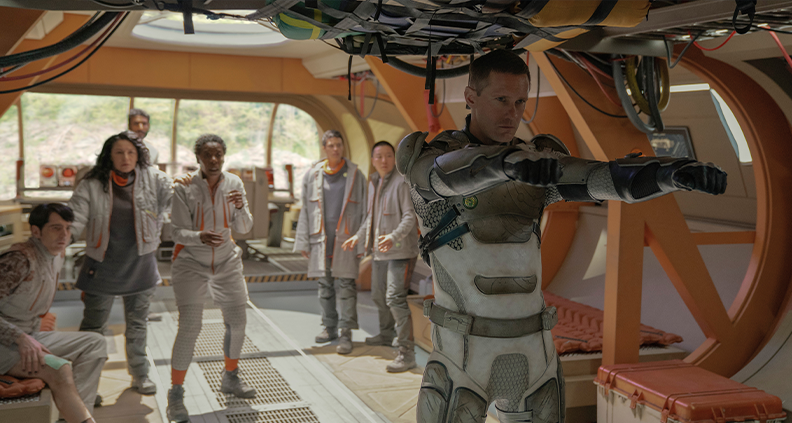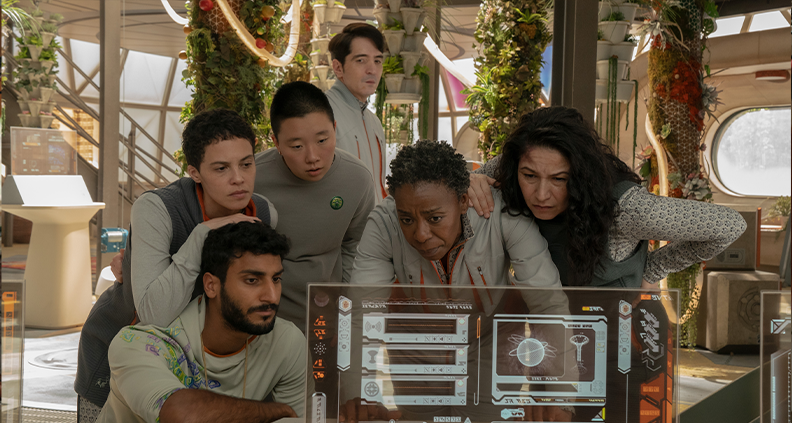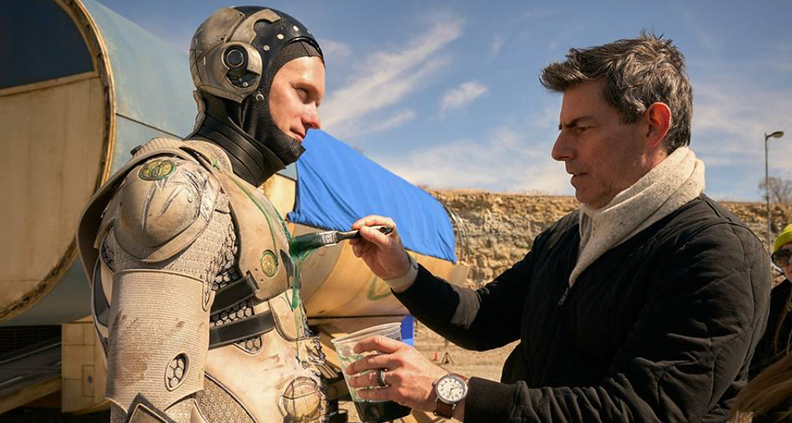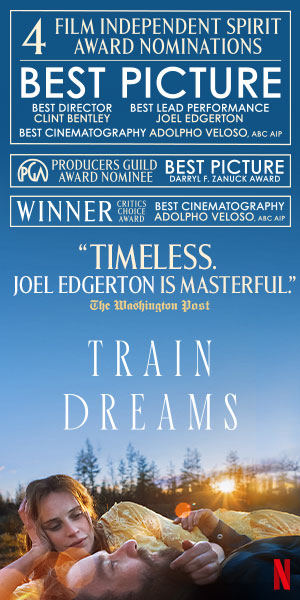Bifurcating Character with Incisive and Witty Inner Monologue: a Masterclass with ‘Murderbot’ Co-Showrunners Paul Weitz and Spirit Awards Winner Chris Weitz
One of the most delightful series to premiere this summer, Murderbot is a witty, quirky sci-fi dramedy that explores thought-provoking themes under the guise of a breezy and surprisingly charming narrative about what it means to be human. The most unexpected element: it is told entirely through the lens (quite literally) of a security android — or “SecUnit” — that calls itself Murderbot. Adapted from Martha Wells’ science fiction books, The Murderbot Diaries, the Apple TV series is written and directed by brothers and Oscar nominees for About a Boy, Chris and Paul Weitz. Chris is also a Spirit Awards winner for the Lulu Wang-directed Chinese family drama, The Farewell.
Since SecUnits issued by the Corporation Rim (a group of mega-corporations ruling the galaxy in the distant future) are sentient, complete obedience to human orders is guaranteed by the “governor module” in each unit. However, Murderbot (Alexander Skarsgård, who nabbed an Emmy for his intricate and chilling performance in the HBO series, Big Little Lies), figures out how to disable its module to gain autonomy. “Murderbot is sentient from the get-go — it’s basically a slavery narrative. It’s important to Martha that Murderbot was always sentient,” Chris says of the close collaboration with consulting producer, Wells. “All the SecUnits are under human control. They can think for themselves but can’t act for themselves. So, they experience this torture of being at the disposal of others.” In addition to exploring themes of humanity and free will, the series also calls into question the issue of personhood, as Paul notes: “To what degree are we going to grant personhood to non-human intelligence?”
A very timely exploration of what a future permeated by AI might look like, Murderbot wisely subverts the tropes by discarding the robot killing machine stereotype. “The world that Martha lays out is dismal in terms of the extraction of labor and the abuse of sentient constructs. The dystopian angle has been done really well, there’s no point in trying to do that. So, we wanted to take a different approach,” Chris explains, adding that “One thing we liked about Martha’s books was that it wasn’t a story about an AI that wants to be like human or to dominate humans. It’s about a different kind of person and what that person wants to do and how they figure it out.” Paul concurs: “On the one end, we have Pinocchio, a non-human thing that wants to be human, and we have the Terminator, which wants to kill everybody. But Murderbot is a third variation.” In fact, it does not yearn to be human at all, let alone control or destroy humanity. “We tend to underestimate how half-assed everything is in reality. Some of the interactions with chatbots now displays utter incompetence and weirdness, so I think AI is going to have neuroses, just like humans,” adds Paul.
Murderbot’s next assignment is to protect a group of hippie scientists from an egalitarian society on an expedition to a hostile planet plagued by flesh-eating centipede creatures and other threats. Led by terraforming expert Dr. Mensah (Noma Dumezweni), the crew includes wormhole scientist Ratthi (Akshay Khanna) and augmented human, Gurathin (David Dastmalchian), who is immediately suspicious of their SecUnit. Since Murderbot’s newfound autonomy has to remain a secret — or it risks being melted down for spare parts — it pretends to be unresponsive when people bully or torture it in myriad ways. It’s no wonder that it has developed a disdain for humans, which we learn through its inner monologue. “I think everybody has an internal curmudgeon that we let out in different degrees. Being skeptical about humans is something that we all share,” Paul says.
Skarsgård’s deadpan delivery of Murderbot’s snarky inner monologue through frequent voiceover narration brilliantly bifurcates the character: the stoic and expressionless SecUnit on-screen is juxtaposed against its honest and amusing opinions about how stupid, inefficient, and downright annoying humans can be. “A lot of that was already in Martha’s novella and we added some ad lib. When you adapt a novel in first-person narrative, you’re effectively listening to voiceover the entire time, but it’s a problem when you get to the screen. We tried to use it to explain things as little as possible, but more as a contrast. There’s comic possibility when a character shows no emotion or reaction whatsoever, but is actually feeling things deeply inside,” Chris explains. “I think we were a little less terrified of voiceover after About a Boy, which has dual voiceovers [for each of the male leads],” Paul adds.
Although much of the inner monologue was in the script, refinements were needed in post when Skarsgård — who pulls double duty as an EP — recorded additional lines over a few months. “We recorded with him in Stockholm, New York, and Los Angeles, and he would try 100 to 200 versions of a line. It’s tricky when voiceover is timed with what’s being revealed [on-screen]. You can’t just have somebody reading it off while the other actors pause until they can say their line. Sometimes we were just guessing how long something would take,” Paul shares. “That kind of led to some of our signature complaints of short episodes,” Chris reveals, referring to the 22-25-minute episodes. “The inner monologue takes up a lot of space on the page. Sometimes we were actually worried that episodes could be too long.”

While Murderbot’s utter lack of sense of humor provides much of the visual comedy, its inner monologue creates serendipitous moments of humor, empathy, wit, and compassion when paired with its caustic views and exasperated dismay at human behavior. “By that point, we had the advantage of looking back on the whole series. Sometimes we got another shot at the tone with the vocal cadence. Recording dialog is a fiddly thing — the way someone sounds one day can be entirely different from another,” Chris points out.
In some ways, the Swedish actor with supermodel good looks may not be the most straightforward choice for the asexual, androgenous Murderbot. But in portraying the hilariously grumpy and battle-weary SecUnit, Skarsgård telegraphs every sinew of emotion with the slightest of micro-expressions, delivering a nuanced and stirring — in several instances, even heartbreaking — performance. “The story has such fragility and tenderness to it,” the actor recalls recently during a post-screening Q&A. As Chris reveals, they “didn’t have lengthy conversations about how he would play it ahead of time,” adding that: “We really trusted what Alexander would to bring to it. But the world that Murderbot was reacting to had to be right in order to evoke the appropriate responses from him. So, we assembled the best cast around him.”
“There are two performances going on simultaneously: what Murderbot is showing to the world versus the internal monologue. After we started shooting, we realized the internal monologue could be very expressive because Alex was playing the on-screen stuff so close to the vest,” Paul says of Skarsgård’s restrained on-screen performance as a contrast against the android’s more emphatic, sardonic private thoughts. Murderbot is normally treated as a piece of equipment or otherwise like garbage. So, when Mensah’s touchy-feely team treats it with warmth and kindness, it is appalled and confused at first, but eventually, it learns to care for them as well. “That was the big decision, both in terms of Alex’s performance and Murderbot’s affection for the crew. Alex was very keen to hold off on giving away that Murderbot really cares about them. And he was right — it helped create tension through the series,” Paul reveals of one of the few changes in an adaptation that hews closely to the books. “We didn’t take anything out of the book, but added a few, including the character Leebeebee (Anne Konkle), to reboot some tension and let Murderbot do something that horrified people in the middle of the season and made them suspicious of it again.”

Constructed from lab-grown organic parts with enhanced inorganic materials, Murderbot was built without socially-curated behavioral norms or a morality framework. However, as Mensah and Raathi insist on treating it as part of the team, it soon exhibits behaviors arguably more human than what we’ve seen from some people — even sacrificing itself more than once to save them — propelling the notion that sentient beings are inherently good. “AI systems or large language models (“LLM”) feed on vast troves of information produced by humanity and are trained by humans. So, they act according to what they think humans might do — they’re made from us. People are basically good, it’s those who are unwell who commit acts that we consider evil,” Chris shares. Later in the series, Gurathin — who sees Murderbot as a threat — reveals that it might have massacred dozens of people on a recent mission. Once exposed, Murderbot is mortified and ashamed. “It’s privacy has been violated, its sense of dignity and inviolability has been trespassed on. That’s true for all kinds of people and creatures,” Chris notes. “There’s shame on a cellular level that comes with being human. And while Murderbot is not human, it does have organic flesh,” Paul adds.
At one point, Murderbot is captured by another security unit from a rival team of explorers, which forcibly inserts a “combat override module” to force it to kill Mensah’s team. To save them, Murderbot tries to kill itself instead. “We didn’t want it to be too sentimental or self-sacrificial. Murderbot was killing itself out of spite — it’s not going to let someone else impose their will and frame it as a rogue SecUnit that killed its clients because it’s evil. It refuses to be defined by others,” Chris reveals, suggesting that androids inherently know right from wrong. “In that moment, it says ‘Well, f*ck that.’ in the voiceover,” Paul adds. “It’s also about the dignity of work. Murderbot is pretty good at protecting people, that’s one of the things that define it as a person.”
Paul thinks that “it’s also a bit about the value of laziness,” which is consistent with what Skarsgård has jokingly said on the Late Show with Stephen Colbert: “There’s very little murder on the show, it’s mostly procrastinating bot.” Paul recalls in the pilot, where Murderbot fantasizes about killing the whole crew. “But it’s like, ‘Then what do I do?’ It would just be stuck here. What’s the point of killing all these people?” He explains Murderbot’s glum persistence in continuing to execute its duties thusly: “It’s like that Samuel Beckett line, ‘I can’t go on, I’ll go on.’ It takes a certain amount of sicko energy to really want to hurt people.” Fortunately for Mensah & Co, Murderbot finds it much easier to simply binge-watch television instead!

One of Murderbot’s most endearing and relatable qualities is its addiction to soap operas: as soon as it gained autonomy, it downloaded and obsessively watches 7,000-plus hours of trash TV and is often annoyed when duty calls. Its favorite is a hysterical Star Trek parody called The Rise & Fall of Santuary Moon. Do what you will to Murderbot, but never criticize the show in its presence! One of the most amusing lines comes from Ratthi, who tries to be buddies with Murderbot (whom he affectionately calls “Sec-y”). Skeptical that an android could be so drawn to any show, he quizzes it about a deep cut of the show, asking if it has watched the episode “where the colony’s solicitor killed the terraforming supervisor who was the secondary donor for her implanted baby?” As Chris recalls, “that line was longer than in the book, but super funny. And Alex added in a reference to a friend of his for bookkeeper Wittenmark.” Since it is perplexed by human emotions and finds eye contact and any kind of physical intimacy revolting, it watches soap operas to learn how to navigate human emotions: “All the emotions are on the surface, that’s partly what draws Murderbot to Sanctuary Moon,” says Paul.
[Warning: spoilers ahead] After Murderbot almost dies trying to save Mensah, it risks being melted down and its memories erased. Fortunately, Gurathin comes through with a Hail Mary stunt before the team purchases its freedom from the Corporation Rim. But when it decides to venture out on its own to figure out what it wants to be, Gurathin understands why it needs to leave the nest to chart a new course. “In the book, Murderbot doesn’t have a final moment with anybody, let alone the person who’s been a thorn in its side. So that seemed like a fun, dramatic opportunity, while still delivering a beautiful ending for Murderbot to ride off into the sunset,” Chris says of the bittersweet and touching ending. “We asked Martha if it was okay to add some details to Gurathin’s history about his addiction, and she was up for it. Some of it was informed by David’s own history. He and Murderbot have another thing in common: it’s hard for them to express themselves emotionally and to trust people,” Paul reveals.
When it came to the ending, “it was really important for Murderbot to become part of a family. But that doesn’t mean the best ending is for it to stay there. There’s an ambiguous and melancholic tone to it,” Paul says. As far as where Season Two might take us, “Its favorite human is Mensah, so she would most likely be the one to draw Murderbot back into the fold. Its lingering connection to Mensah and the people it left behind will come into play. Eventually, it’s about whether it has learned enough about itself to decide what home would look like and who it wants to be, “Chris predicts of our favorite SecUnit’s nascent journey in self-discovery.
Produced by Paramount Television Studios, all 10 episodes of Murderbot are streaming on Apple TV.
Want to vote for the winners in the 2026 Spirit Awards? Join Film Independent today! Before you know it, you’ll be knee-deep in screeners and attending in-person screenings, special events, workshops, and more. The 2026 Spirit Award nominations will be announced on December 3.
Keep up with Film Independent…
[Header image: Alexander Skarsgård in “Murderbot,” now streaming on Apple TV.]

